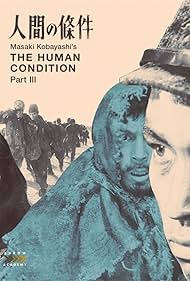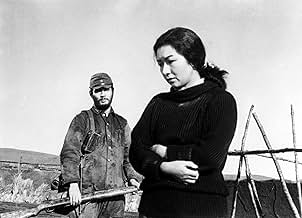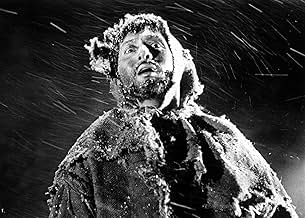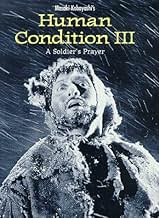IMDb RATING
8.8/10
8K
YOUR RATING
His ideals challenged by life as a conscript in war-time Japan's military, a pacifist faces ever greater tests in his fight for survival.His ideals challenged by life as a conscript in war-time Japan's military, a pacifist faces ever greater tests in his fight for survival.His ideals challenged by life as a conscript in war-time Japan's military, a pacifist faces ever greater tests in his fight for survival.
- Awards
- 5 wins total
Storyline
Did you know
- TriviaIs the first Japanese movie in stereo.
- ConnectionsFollows The Human Condition I: No Greater Love (1959)
Featured review
Ningen no jôken is a masterpiece film but is also painful to watch most of the time. Nonetheless, it is a tour de force to be lauded for its direction, cinematography and acting at every turn. Most of those commenting in previous discussions mention the virulent anti-war sentiment of the film which is abundantly evident. It was interesting that much of the film is autobiographical, inspired by Kobayashi's war experiences. He too refused to be an officer when he qualified, and stayed a private throughout the war. An interesting point came up when I was watching the fourth DVD in the Criterion edition of The HumanCondition which is a series of three insightful interviews. During his comments the director Masahiro Shinoda mentioned that he thought at the time, the romantic love Kaji had for his wife, Michiko, was overly sentimental and unrealistic. He thought that it was due to the fact that Kobayashi and his peers were born of another age whose romanticism was the norm and unsullied by his generation's sobering war experience. He said that he had also consulted the internet to see the opinions of the film among contemporary young people in Japan today, and found that they too, thought the love unrealistic. He felt the love should have been more erotic and less idealized. The remarks of another commentator solidified my opinion of this issue about Kaji's love. That writer stated that the title really means more like "condition for being human." This confirmed my opinion that Kobayashi's point of the film is that what makes one human, in the best sense of the word, is love. Otherwise we devolve into some type of cruel bestiality found in the phrase 'man's inhumanity to man.' This inhumanity is evident throughout the film, whether in the sadism of the other Japanese soldiers, the cruelty of the guards to the Chinese prisoners, or in the malice of the of the Russian overseers. However, the Kaji character is set apart: he sticks to his ideals, he is humble, he displays selflessness as seen when he gives his food to another or when leading the men and puts them ahead of himself. He is a type of everyman whose being is elevated above merely satisfying physical needs and responding to base instincts. He remains an ennobled human not a saint above the fray, but his love gives him the will to live, to continue on and to even do good when surrounded by evil. Love is the condition for being human.
- jouler500-art
- Apr 8, 2010
- Permalink
- How long is The Human Condition III: A Soldier's Prayer?Powered by Alexa
Details
- Release date
- Country of origin
- Languages
- Also known as
- Human Condition III: A Soldier's Prayer
- Filming locations
- Rishiri-Rebun-Sarobetsu National Park, Hokkaido, Japan(The final scene was shot on the Sarobetsu Plain.)
- Production companies
- See more company credits at IMDbPro
- Runtime3 hours 10 minutes
- Color
- Aspect ratio
- 2.35 : 1
Contribute to this page
Suggest an edit or add missing content

Top Gap
What is the German language plot outline for The Human Condition III: A Soldier's Prayer (1961)?
Answer































